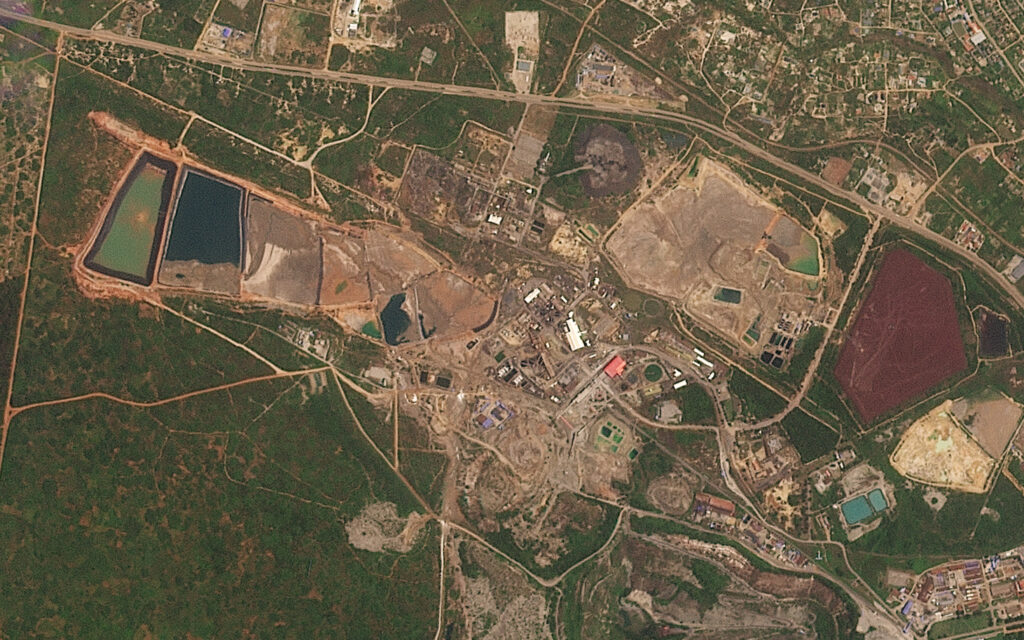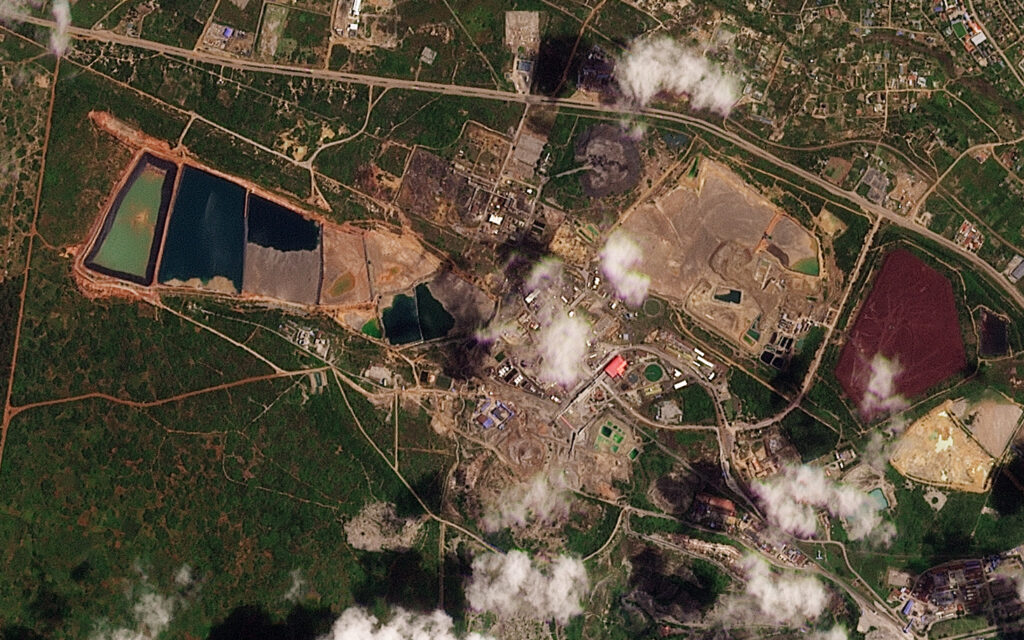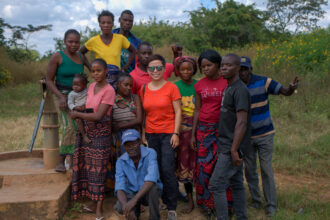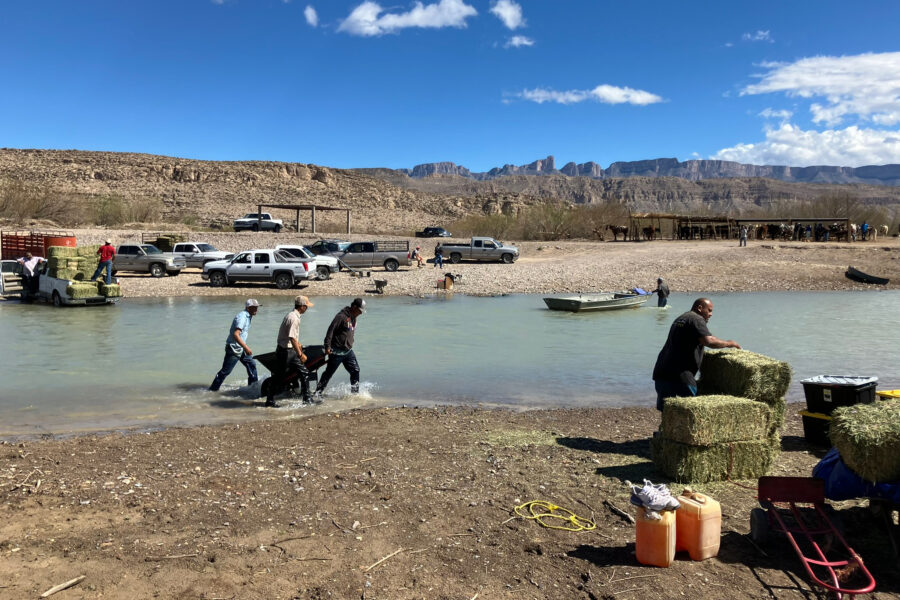Planet China: Sixth in a series about how Beijing’s trillion-dollar development plan is reshaping the globe—and the natural world.
A Chinese mining company that spilled toxic waste on impoverished Zambian villages got people to waive their right to sue using a government-ordered compensation process, according to documents reviewed by Inside Climate News.
In July, the Zambian government ordered Sino-Metals Leach Zambia to provide interim compensation to 454 farmers after the company’s waste pit, known as a tailings dam, spilled millions of gallons of acidic sludge containing lead, arsenic and other heavy metals into communities and rivers in February.
“Without immediate intervention, the consequences for future generations of Zambians will be severe and long-lasting,” said a letter written by a pollution control firm hired, and then dropped, by Sino-Metals.
And there was a catch.
Lawyers and a resident told Inside Climate News that in order to receive payment, Sino-Metals required locals to sign “Deed of Settlement and Release” agreements.
One of the agreements, reviewed by Inside Climate News, says that Sino-Metals was making the payment “as full and final settlement of all claims arising from any damage, injury, or inconvenience” experienced by the affected individual as a result of the spill.
The agreement, dated July 2025, is signed by the payment recipient and a Sino-Metals official. The Zambian government does not appear to be a party to the agreement and did not sign it, though the document references two ministries’ involvement in assessing the amount of damages.
The affected individual, the agreement says, “accepts and acknowledges” that the amount they will receive from Sino-Metals “is full and final settlement” of all claims.
Legal experts say Sino-Metals could use the agreements to shield itself from demands for $420 million in emergency compensation and $90 billion for long-term cleanup and restoration that have been sent to the company on behalf of the victims. After a 2015 tailings dam spill in Brazil, mining companies BHP and Vale, facing hundreds of lawsuits, agreed to pay $30 billion in compensation.
Neither Sino-Metals nor the Chinese embassy in Zambia’s capital of Lusaka responded to written requests for comment. Responding to questions for an earlier Inside Climate News story about the spill, the embassy gave a three-page written statement, saying Sino-Metals would “strictly implement compensation measures in accordance with regulations to ensure every affected household receives the compensation it deserves.”
A July 31 post on Sino-Metals’ Facebook page about the compensation process quotes the company’s assistant CEO saying, “This is not merely a fulfilment of our responsibility, but also a reaffirmation of the company’s long-standing commitment to the [surrounding] community and the nation as a whole.”
Sino-Metals is a subsidiary of the Chinese state-owned mining giant China Nonferrous Metal Mining Group, and its operations are part of Beijing’s sweeping Belt and Road Initiative across the Global South.
Zambia’s Ministry of Green Economy and Environment referred questions to the Zambia Environmental Management Agency. That agency said that “as a regulator, we do not have a position on that action,” and referred questions back to the Ministry of Green Economy and Environment, which did not respond.
In late August, two groups of Zambians impacted by the spill sent Sino-Metals separate demands for emergency relief and long-term cleanup and compensation funds. The groups were putting the company on notice that they would file lawsuits if the demands were not met.
The first letter, sent on behalf of 47 households, seeks $220 million as interim compensation for relocation, medical testing and treatment, and restoration of livelihoods. It also demands Sino-Metals pay $9.7 billion into a “Victims and Environmental Compensation and Rehabilitation Fund” co-managed by the government and independent trustees, and that the company comply with a government order for environmental restoration and monitoring.
Malisa Batakathi, one of the lawyers representing the 47 households, said most of his clients cannot read and were not given an opportunity or adequate time to seek independent legal advice before signing the release agreements.
“Most of them did not know the implications of what they were signing,” Batakathi said.
The second demand, sent on behalf of about 200 individuals, seeks $200 million as an emergency fund and $80 billion to be paid into an escrow fund managed by the government for long-term clean up, ecological restoration and compensation.
It also demands Sino-Metals “stop threatening and preventing our clients” from speaking with their lawyers and nonprofit workers, and to “immediately respect the affected communities’ rights to freedom of movement and association as guaranteed by the Constitution of Zambia.”


In recent months, journalists, nonprofit workers and lawyers say Sino-Metals and local police have surveilled them or restricted them from visiting one of the most impacted communities, known as Kalusale.
Brigadier Siachitema, one of the lawyers who sent the second demand, said he and his colleagues have repeatedly been prevented from visiting their clients in Kalusale.
“Even now, there are a lot of mine police on the ground,” he said, referring to the company’s private security personnel.
According to Siachitema, his clients, who live in a semi-remote area with no electricity or running water, have had extreme difficulty accessing outside information about the compensation process.
“I have never experienced anything like this—where my clients have to either book a taxi or walk for hours to meet with me secretly,” he said. “They are facing untold barriers to accessing justice.”
Ceasar Katebe, program manager for the nonprofit Zambia Alliance of Women, said he sought to monitor the July compensation process in Kalusale. He never made it, deciding not to go after community members warned him police were monitoring the area and might arrest any outsiders trying to come in.
Katebe said local police previously told him that he needed permission from Sino-Metal to visit Kalusale.
“The level of intimidation and harassment is to the point where we as civil society can’t work freely,” he said.
The Chambeshi Police Station, which covers the area, did not respond to a request for comment.
“Serious Risk”
A 385-page report leaked to the press last week revealed that the spill released more than 1.5 million tons of toxic waste, 30 times what Sino-Metals previously reported.
Sino-Metals had hired the South African firm Drizit Environmental to conduct an independent assessment of the damage. But after Drizit notified the Zambian government and the company of its findings, Sino-Metals fired the firm, claiming a contractual dispute, according to a government statement.
This story is funded by readers like you.
Our nonprofit newsroom provides award-winning climate coverage free of charge and advertising. We rely on donations from readers like you to keep going. Please donate now to support our work.
Donate NowIn June, Drizit wrote a letter to the Zambian government notifying officials that the extent of the spill was far worse than previously reported and that the spill had “created a toxic environment capable of causing irreversible harm to both the ecosystem and human health.”
Drizit’s testing, thousands of samples taken by a team of about 30 experts, showed “extremely hazardous substances” including cyanide, arsenic, uranium and other heavy metals across land and river banks. There was so much pollution, the letter said, removing it all would take 100 trucks a day for a year.
“Communities downstream are at serious risk of developing birth defects, cancers, liver and lung disease, heart conditions, and other chronic illnesses,” the letter said.
“These outcomes are not speculative,” it added, “they are well-documented consequences of exposure to the substances we have found.”
Industry experts said the contamination has likely spread into aquifers, bore holes and other groundwater sources. Removing those toxic pollutants, they said, is urgent: Zambia’s rainy season begins around November and heavy rains could cause the contamination to migrate, affecting an even larger population of Zambians.
The Zambian government announced in June that it was taking over responsibility for carrying out an environmental assessment and cleanup of the damage. In July, nearly five months after the spill, the government put out a call for bids.
Heavy metals do not naturally biodegrade and must be physically removed and contained. That’s why leading industry standards on tailings dam construction require the waste pits to be built to last 10,000 years.
Last month, an independent consultant for the Finnish embassy in Lusaka said it had found high levels of 16 heavy metals, including lead, arsenic and uranium, in the tailings waste.
The U.S. embassy in Lusaka issued a warning on Aug. 6, advising its citizens to avoid the impacted areas and relocating its own personnel. The alert noted that contaminants could become airborne, posing a health threat if inhaled.
About This Story
Perhaps you noticed: This story, like all the news we publish, is free to read. That’s because Inside Climate News is a 501c3 nonprofit organization. We do not charge a subscription fee, lock our news behind a paywall, or clutter our website with ads. We make our news on climate and the environment freely available to you and anyone who wants it.
That’s not all. We also share our news for free with scores of other media organizations around the country. Many of them can’t afford to do environmental journalism of their own. We’ve built bureaus from coast to coast to report local stories, collaborate with local newsrooms and co-publish articles so that this vital work is shared as widely as possible.
Two of us launched ICN in 2007. Six years later we earned a Pulitzer Prize for National Reporting, and now we run the oldest and largest dedicated climate newsroom in the nation. We tell the story in all its complexity. We hold polluters accountable. We expose environmental injustice. We debunk misinformation. We scrutinize solutions and inspire action.
Donations from readers like you fund every aspect of what we do. If you don’t already, will you support our ongoing work, our reporting on the biggest crisis facing our planet, and help us reach even more readers in more places?
Please take a moment to make a tax-deductible donation. Every one of them makes a difference.
Thank you,














